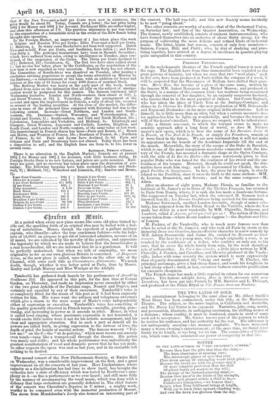PARISIAN THEATRICALS.
' At the melodramatic theatres of the French captital lunacy is now all the rage. The English have from time immemorial been regarded as the great patrons of insanity, but when we state that two "mad plays," each in five acts, have been produced at Paris within the compass of a week, it will be suspected that the Mmeenases of Bedlam have shifted their quar- ters. Marie Rose, the heroine of a piece of the same name, written by the famous MM. Anicet Bourgeois and Michel Masson, and produced at the Galte, is a maniac of the common kind; her madness being occasioned through the removal of her daughter, by an unjustly suspicious husband, who fancies that he is the most putative of fathers. But Count Raphael, who has taken the place of Uncle Tom at the Ambigu-Comique, and , shines in Le Chateau des Tilleuls—the new production of MM. Decourcelle and Raymond Deslandes—is far more original in his aberrations. Left to himself, he is little more than an idiot, but when a certain mesmeric doc- tor approaches him he lights up wonderfully, and becomes the tenant at will of the doctor's intellect. This piece, we suspect, will be talked about. Like a distant sea-coast, to which the voyager seems to make no sensible approach after a long hour of travel, so does M. Nieder- meyer's new opera, which is to bear the name of Lea Derniers Jour., de he Fronde, or Une Ifuit de is Fronde, or simply Les Frondeurs remain as it were fixed in the future. We are now informed that it will not make its appearance on the boards of the Academie Imperiale till the end of the month. Meanwhile, the story of the escape of the Duke de Beaufort, which is one of the most conspicuous anecdotes connected with the his- tory of the Fronde has assumed a dramatic shape at the Opera Comique, with the title of in Rol des Ha/lea—the name notoriously given to that popular Duke who was famed for the readiness of his sword and the un- readiness of his tongue. However, though he could not speak, the dra- matists have made him sing; and he is represented by Chollet, the ori- ginal Postilion de Longjumeau. In fact, the piece by its origin, is closely related to the Postillon, since it owes its birth to the same authors—MM. de Leuven, Brunswick, and &vest° ; and to the same composer—M. Adam.
After an absence of eight years, Madame Plessis, as familiar to the habitues of St. James's as to those of the Theatre Francais, has returned to Paris from Russia, where' it is said, she has made a handsome fortune. She reappeared on Tuesday last, when the esteemed M. Samson took a farewell benefit ; Les Fausses Confidences being revived for the occasion.
Madame Suiwanech, another London favourite, though of minor cele- brity, has migrated from the Palais Royal to the Varietes, where she has made her &Vat in a new vaudeville by MM. Clairville, Delacour, and Lambert, called L 'Amour, qu'cet quo c' est quo fa ? The notion of the piece seems taken from—where do our readers suppose ?—the Daphnia and Chlo., of Longus.
M. Fechter, of the Vaudeville, who is much more famous now than when he acted at the St. James's, and who took all Paris by storm in the immortal _Dame aux Camel* has an effective character in anew comedy by MM. Adrian Decourcelle and Jaime file' entitled On Denaande un Goa- veraeur. The hero is a young man, who, though originally a roué, is so touched by the confidence of a father, who confides an only son to his care, that he saves the whole family from ruin, by the most dauntless acts of self-sacrifice. La Vie d Lon marcher a little piece written by MM. Clairville, J. Cordier, and Cavailhac, and likewise produced at the 'Vaude- ville, lashes with some severity the system which is more expressively than elegantly denominated the "cheap and nasty." M. Pluchet, the principal personage, gives a bad cheap dinner, and sends his daughters to a bad cheap school ; until, at last, excessive badness cures his predilection for excessive cheapness. The French stage has made a little reprisal in return for our numerous piracies. The famous Adelphi farce, How to Settle Accounts with your _Laundress, has been put into French by MM. Barriere and L. Thiboust, and produced at the Palais Rdyal as line _Femme dams ma Fontaine.


























 Previous page
Previous page